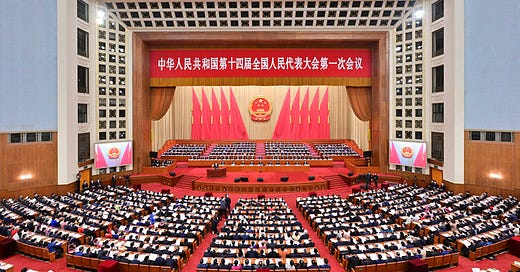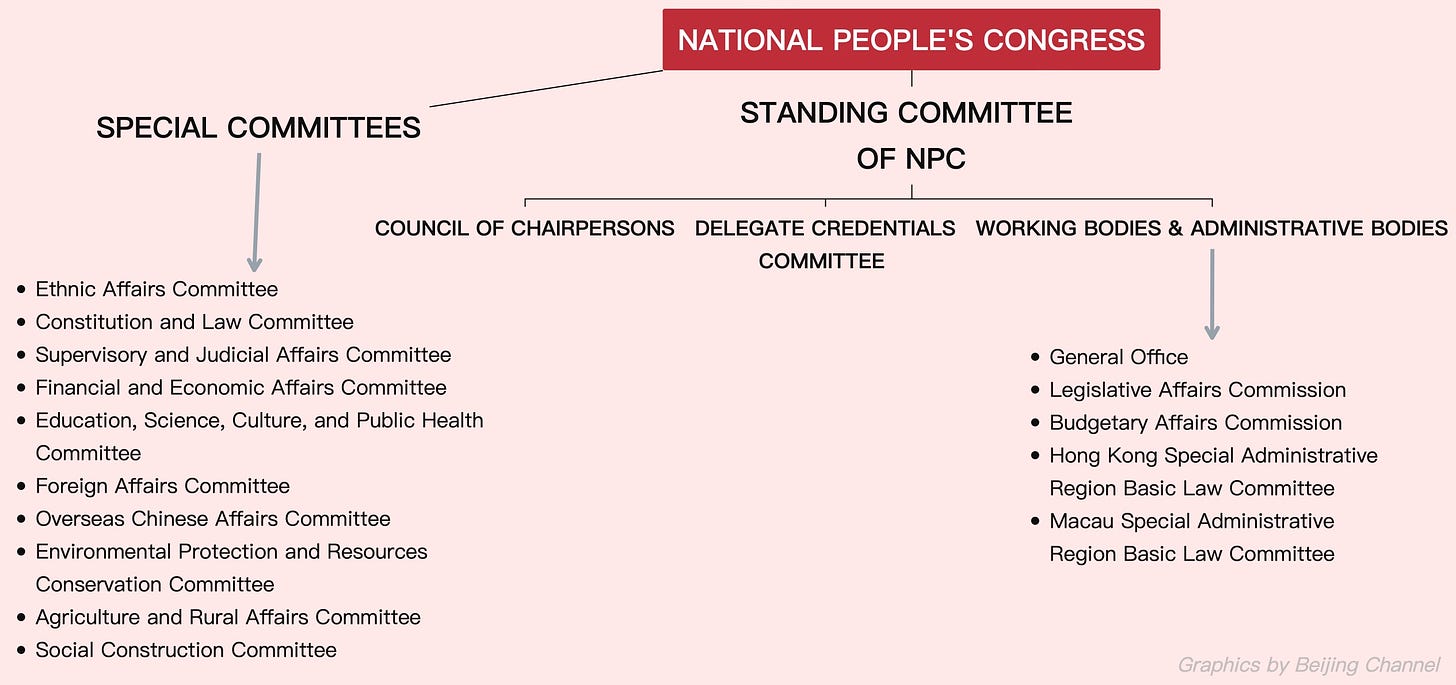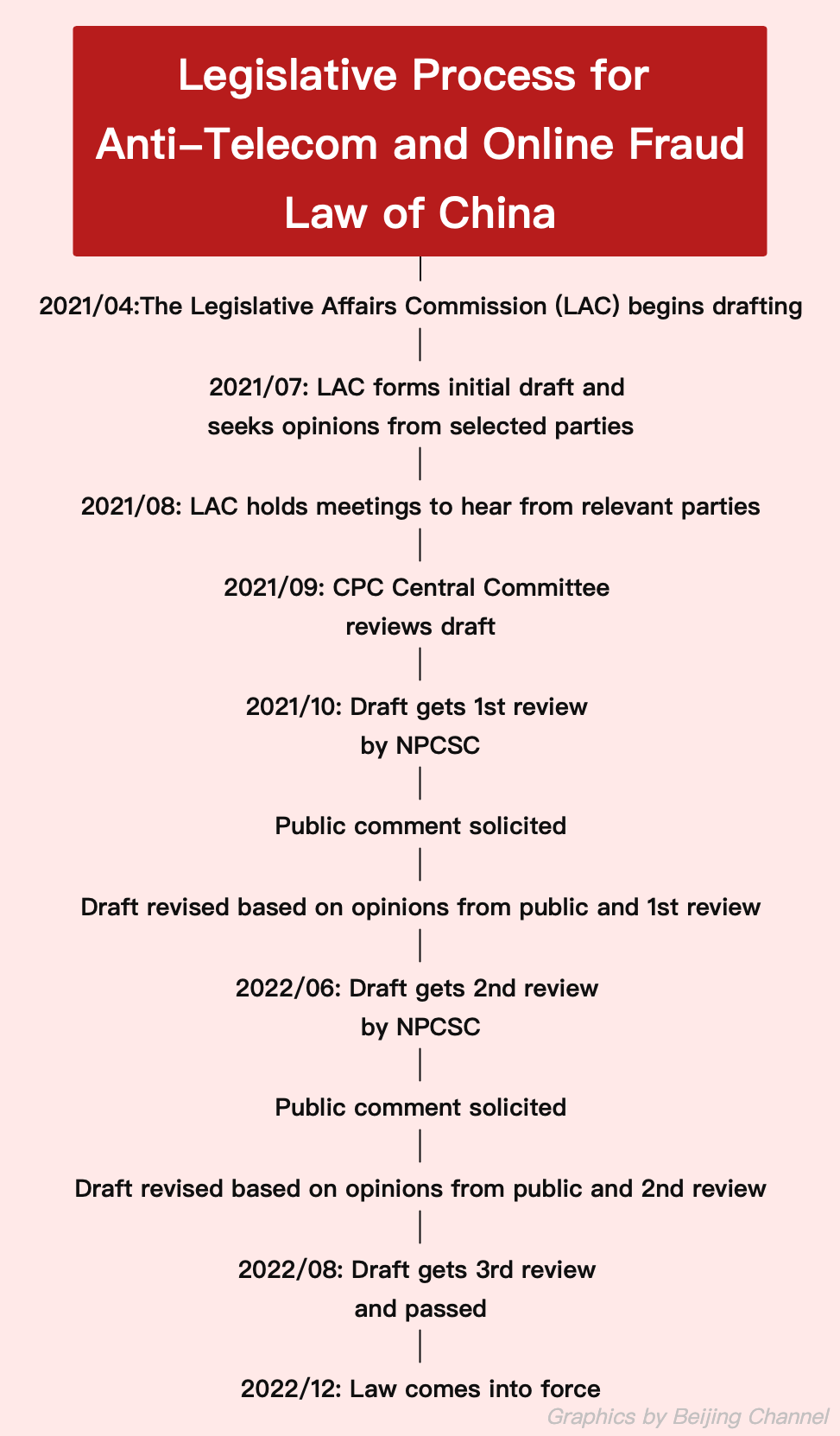A detailed walk through of China’s legislative process
With exclusive behind the scene details shared by lawmakers
Before we dive into the newsletter, allow me to insert a small ad. Several of my colleagues are setting up a Mastodon page to update info for China's Two Sessions. Visit 【http://chinanews.social】and follow the gang, so you don't miss the latest.
Just before the two sessions, your host was granted an interview with two officials at the National People’s Congress Standing Committee (NPCSC) Legislative Affairs Commission (LAC), who explained, in the most complete way possible, how a law is made in China.
Before we start, here’s a chart of the National People’s Congress structure and its standing committee so that you don’t get lost in all the names mentioned in this newsletter.
Now let’s officially start the process.
I The Blueprint: Who and how gets to decide what laws to draft or revise?
Officially, the NPC releases five-year and 1-year legislative plans to signal to the public what laws will be drafted and revised in the next year or five years.
Here are the latest five-year plan and one-year plan, respectively. Understandably, the five-year plan is more general, while the 1-year plan is usually more precise.
NPCSC annual Legislative plan for 2022
In the plans, prospective new laws or revisions are sorted into categories based on their priority and readiness. These plans are not set in stone in that the NPCSC could decide to work on an urgent law or revision that was not on the plan, and should the NPC and its standing committee be unable to finish the plan, they would include the unfinished business in future legislative plans.
In putting together the plan, the LAC collects legislative ideas from many sources, such as
1. China’s top political agenda.
2. Suggestions from other government agencies.
3. Bills and suggestions by NPC Representatives.
4. Opinions gathered from Grassroots Legislation Liaison Offices.
For the Anti-Telecom and Online Fraud Law, Chinese President Xi Jinping instructed in April 2021 to crack down on telecom and online fraud. The NPC swiftly decided to draft a new law instead of amending an existing one. The LAC began relevant work at the end of April, formed an initial draft in July and sought opinions from relevant government agencies, local governments and companies. The LAC held meetings in August to hear opinions from relevant sides for a second round. In September, the CPC Central Committee reviewed the draft and agreed in principle. In October, the NPCSC conducted a first review and made large-scale changes consequently. A second review was held in June 2022, and the draft was reviewed for a third time and passed in August 2022. The law came into force on Dec. 1, 2022.
II The Channel: The NPC or its Standing Committee?
According to the Chinese Constitution, the NPC gathers once a year, and the NPCSC normally meets every other month on even-numbered months. The NPC and the NPCSC both wield legislative power, and the Legislative Law further specifies each’s role in the legislative process.
So what laws get passed by whom? According to the Constitution, the constitution, civil codes, criminal codes, organizational laws of state agencies, and other basic laws are to be passed, revised, and amended by the NPC. Though the law does not specify, in practice, laws not listed by the Constitution are mostly made by the NPCSC.
Take the 13th NPC and its standing committee as an example. It made 47 new laws and revised and amended 111 laws. Among them, the Constitution, Supervision Law, Foreign Investment Law, Civil Code, NPC Organic Law, NPC Rules of Procedure and Organic Law of Local People’s Congresses at All Levels and Local People’s Governments at All Levels went through the NPC.
Normally, drafts that go through the NPC would be considered, debated and voted on during the same session. However, if the NPC session feels there are major issues to be further deliberated, the NPC may decide to mandate the NPCSC to consider opinions expressed by NPC deputies and redraft the text.
As the vast majority of laws are made by the NPCSC, the newsletter will focus on the NPCSC legislative process below.
III The Draft: Who gets to take the first crack?
According to the Legislative Law, the following bodies may propose drafts of laws, revisions or amendments to the NPCSC. They are the Council of Chairpersons of the NPCSC, Special Committees of the NPC, State Council, Central Military Commission, Supreme People's Court, Supreme People's Procuratorate, and soon to be added, the National Supervisory Commission. Any 10 NPCSC members could also co-sign a proposal.
In practice, this means that the above-mentioned bodies can spearhead drafting a law, revision or amendment. Who gets chosen for a certain law?
As a matter of principle, the body that made the proposal usually will take the lead in the drafting.
The Military Commission, the top court and top procuratorate, and the soon-to-be-added National Supervisory Commission each have clear administrative duties. They are mostly responsible for drafting work of laws in their respective fields.
Similarly, for administrative laws concerning the administrative realms of a specific State Council agency, that agency would usually take the lead.
Some laws may also be drafted by the Council of Chairpersons and special committees of the NPC. In practice, it’s mostly the LAC that is responsible for drafting laws nominally proposed by the Council of Chairpersons.
For Anti-Telecom and Online Fraud Law, because it involves finance, telecommunication and internet regulatory agencies and law enforcement, it’s difficult for any one agency to complete the draft speedily. Therefore it fell on the LAC, specifically the Criminal Law Office of the LAC, to draft the law.
As was explained to me, it’s extremely rare for a group of 10 NPCSC members to co-sponsor a draft and submit it to the NPCSC.
IV Drafting: Who gets invited for input?
To draft a law, revision or amendment, the leading government body would first conduct research, primarily on four aspects.
1. Clarifying the issue to be addressed by the proposed law.
2. Fully understanding the guidelines set out by the Party Central Committee, if applicable.
3. Take note of existing laws in the field to ensure compatibility between the new and existing ones.
4. Looking up relevant legislative activities of foreign countries.
The drafting body would also reach out to relevant parties to solicit suggestions and recommendations in writing or by convening meetings.
1. From other government agencies.
Whichever government agency we think may be relevant to the draft of concern, we will bring them into the loop.
2. From experts. The drafting body normally has a pool of experts that could be reached out to. In the case of needing subject matter experts, they could ask for recommendations from government agencies who are familiar with such experts.
We take care to invite experts with different views to the meetings to hear both sides of the argument. If we ask another government agency to recommend experts, we would tell them to follow the same principle.
3. From SOEs and the private sector. When a law greatly concerns businesses, some of them will be invited to participate in the meetings. Foreign companies are sometimes invited when their interest is at stake, too, as is in the case of The Foreign Investment Law.
When we were drafting the Labor Contract Law(《劳动合同法》), a number of foreign entities and foreign enterprises submitted their opinions. We carefully studied those opinions.
4. From standing committees of provincial-level People’s Congresses. For the LAC, they would normally select a number of provinces for each legislation they think may have a bigger interest and greater input to the draft while considering balancing representations from different parts of the country.
When we solicit opinions from provincial level PCs for a second round after the draft is done, we would select a different set of provinces so that more provinces have the opportunity to express their opinion.
5. Suggestions from NPC representatives. The drafting body may consider relevant suggestions from NPC representatives in recent years.
For Anti-Telecom and Online Fraud Law, the following parties were reached out to during the drafting process.
The Office of the Central Cyberspace Affairs Commission, Ministry of Industry and Information Technology, People's Bank of China, China Banking Regulatory Commission, grassroots public security agencies, China Telecom, China Unicom, China Mobile, commercial banks including ICBC, Bank of Communications, Construction Bank of China, and private businesses such as Tencent, Alibaba and Douyin, the Chinese version of TikTok. The drafting team also visited Beijing, Zhejiang, Jiangsu, Yunnan, Hubei, and Fujian to meet with regional governments and companies.
There are a few different kinds of meetings for parties of interest to present their arguments, namely
1. Conference (座谈会) These are the most often held type of meetings
2. Hearing (听证会)Hearings are held to address issues with great concern to the public, such as sale bans or license-based traffic restrictions.
3. Deliberative Meeting(论证会)Deliberative Meetings are held to discuss a particular issue within a draft, often controversial in nature.
After the first draft is done, it will be sent to some of the parties previously involved for opinions again, and repeat the cycle until the draft is considered to be ready.
After the draft is considered ready, it will be checked for compliance. There’s no uniform approach to this. State Council Agencies normally submit their drafts to the Ministry of Justice①. The top court, the top procuratorate, the military commission, and the soon-to-be-added National Supervisory Commission each have their compliance offices.
①Prior to 2018, drafts by State Council agencies went through the State Council Legislative Affairs Office, but the office was absorbed by the MOJ in 2018.
V The Review: Three is the charm
When a draft is considered ready, it is submitted to the NPCSC, and the Council of Chairpersons will decide if it is to be reviewed during an NPCSC session.
During the review, an official from the drafting body will explain the draft to the NPCSC full meeting. Then the meeting will be divided into six groups, each of which will review the draft.
The group sessions are attended by NPCSC members, members of NPC special committees, and sometimes NPC representatives. The sessions will conduct a more thorough discussion on the draft.
VI Seeking Comments
After the first review, the draft would usually be released to the public seeking comments.
The drafting body would consider both the public opinions and opinions gathered during the review, consider, and absorb them into the draft.
In the case of Anti-Telecom and Online Fraud Law, it received a total of 57,000 comments from 25,800 people during two rounds of comment-seeking.
Since the comment-seeking process is open to the public, foreign entities, such as embassies and commerce chambers, have submitted comments in this process.
We would attach great importance to their opinions and carefully consider them.
As in the case of LAC-led legislation, the LAC would gather the opinions, formulate recommendations, and submit the recommendations to the Constitution and Law Committee, a special committee of the NPC that will take over from the LAC and carry the legislation in its next stages.
VII Passing
The draft moves onto a vote if the Council of Chairpersons considers it to be ready. The draft is passed if the majority of all NPCSC members vote yes.
According to the Legislation Law, each draft would normally undergo three reviews and would pass after the third review, but exceptions exist.
If a consensus has been reached over a law, it could pass after the second review.
If a draft is not yet mature, different parties have differences over its necessity and feasibility, or relevant parties fail to reach a consensus after the third review, the draft could undergo additional reviews, unlimited in number. According to the interview, the record number of reviews a draft had to undergo was eight, held by The Property Law (《物权法》).
Normally, a new review is scheduled if the Council of Chairpersons considers the draft to have moved forward substantially. According to the rules, the review process is ended if a draft fails to secure a fresh review in two years. But in practice, to prevent a draft from going into the bins, the NPCSC would purposefully review a draft again before the two-year mark, in a move known as “reactivating” the draft.
The coming revision of the Legislation Law would directly give the Council of Chairpersons the power to prolong the shelf-life of a draft so that when a draft hits the two-year mark, it would be at the Council of Chairpersons’ discretion whether to allow the process to end.
VIII Thoughts
The Chinese legislative process, as dictated by the constitution and the legislative law, is quite complete and continues to improve. It can be seen that the NPC and the NPCSC play a central role in the entire process and exercise their constitutional power.
Personally, the process exceeded my expectations in terms of openness. During various parts of the process, different stakeholders all have an opportunity to input their opinion. The NPCSC hears voices from other government agencies, NPC representatives, state-owned and private companies, experts, and even foreign entities.
Also worth noting is that the entire process is relatively transparent and predictable. Most of the processes are reported by the media or updated timely on the NPC website.









An excellent explainer! I'll be referring anyone who wants to learn about the legislative process to this post.